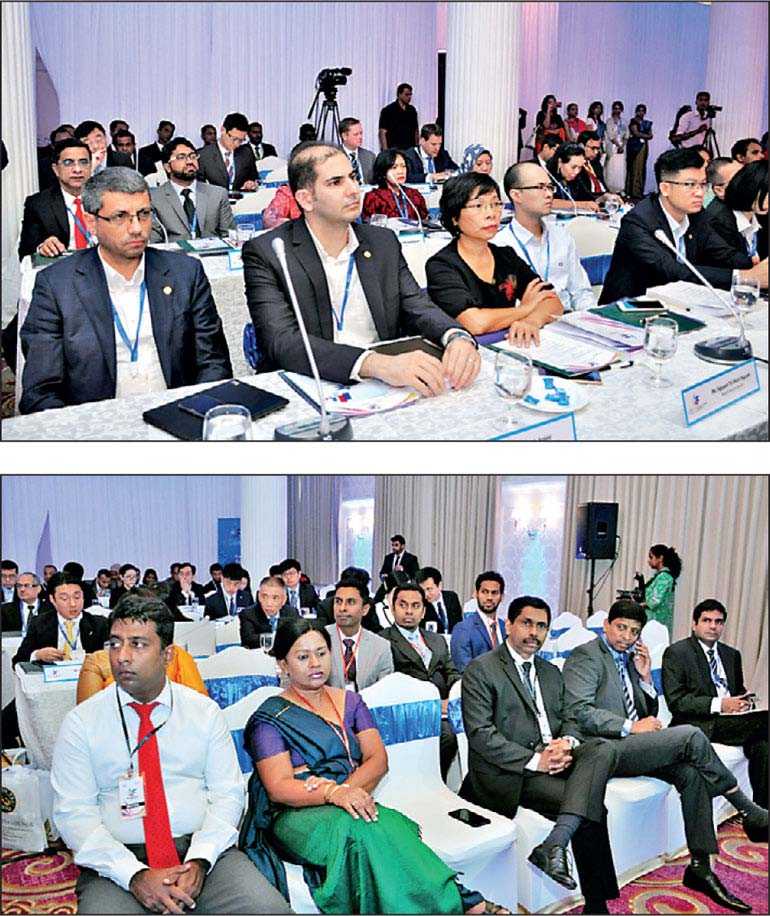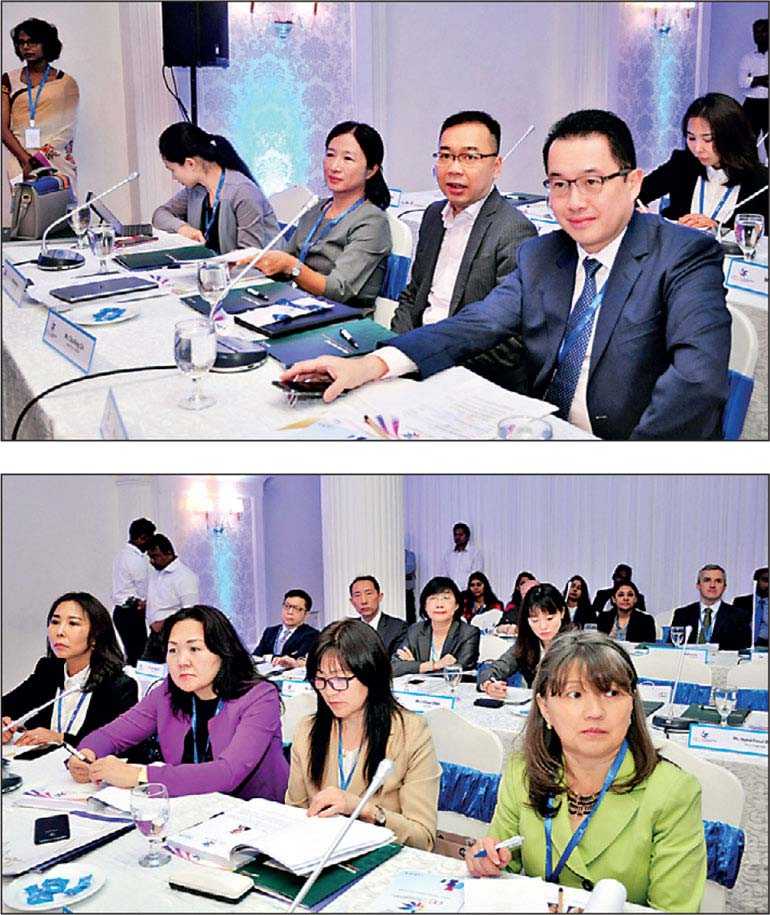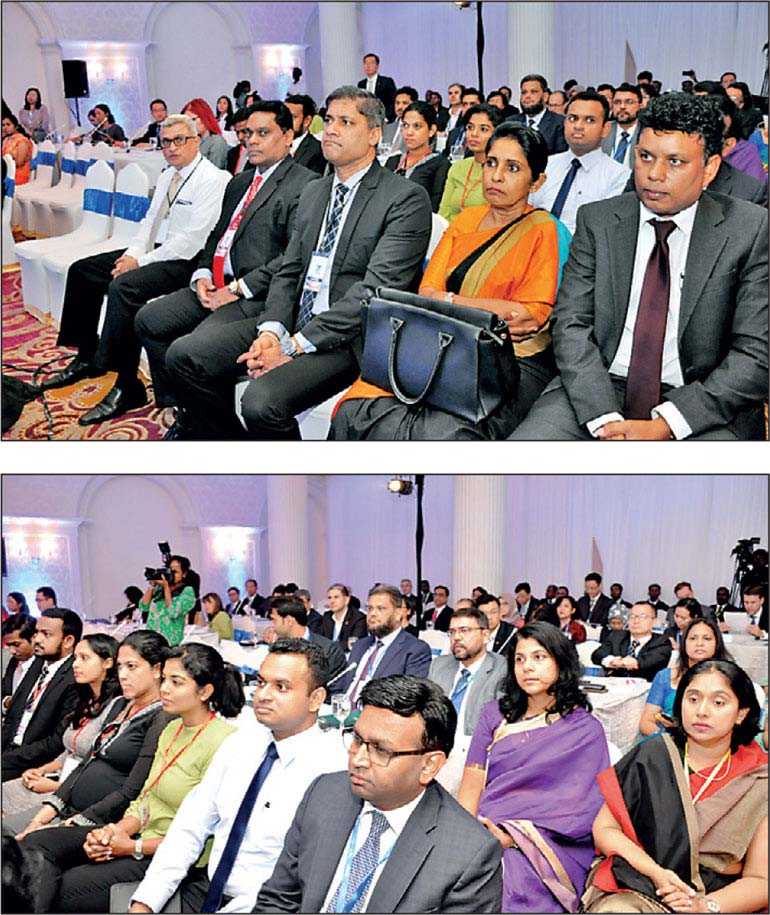Tuesday Feb 24, 2026
Tuesday Feb 24, 2026
Friday, 14 December 2018 00:00 - - {{hitsCtrl.values.hits}}
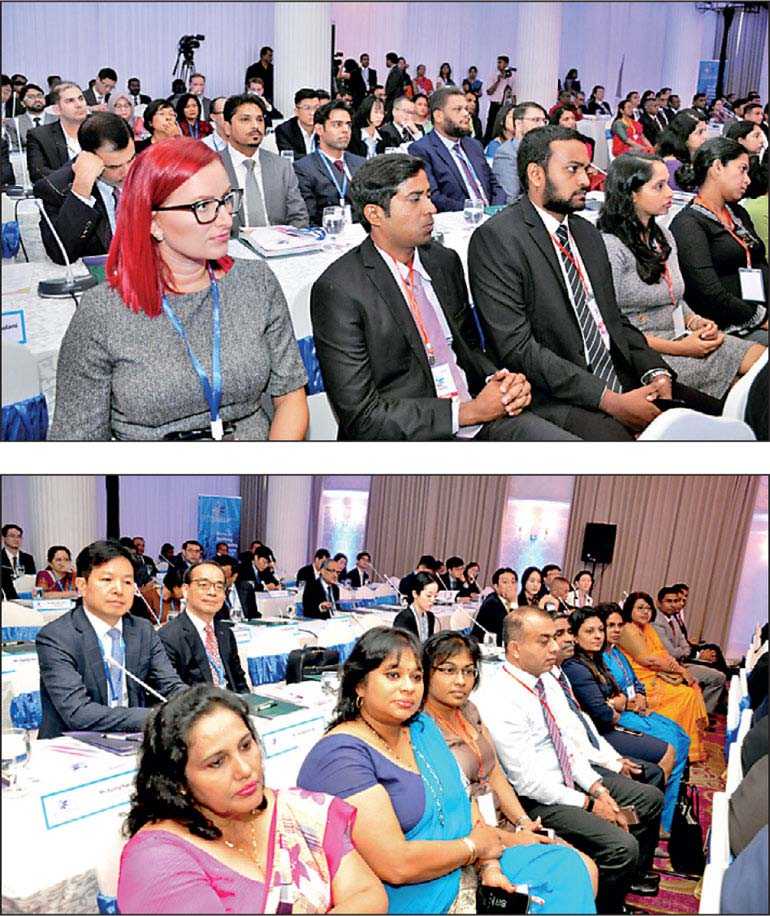
By Charumini de Silva
The 22nd Annual General Meeting (AGM) of the Asia-Pacific Central Securities Depository Group (ACG), themed ‘FinTech – shifting or shaping the future of CSDs’, discussed key issues relating to ACG policy and activities as well as the future a Central Securities Depository (CSD) in light of new technological developments with the participation of over 100 delegates representing 19 countries across 25 depositories and clearing organisations in Colombo recently.
 |
Central Bank Governor Dr. Indrajit Coomaraswamy |
 |
CSE and CDS Chairman Ray Abeywardena |
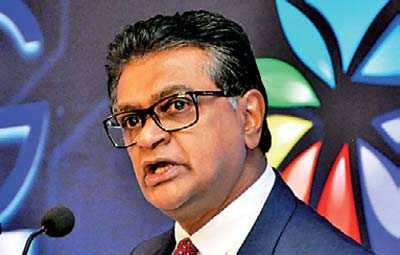 |
SEC Chairman Ranel T. Wijesinha |
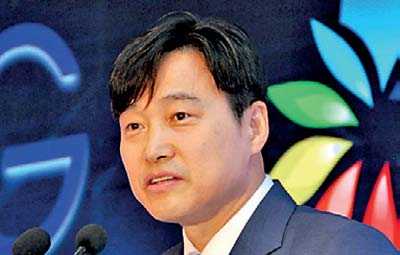 |
ACG Executive Committee Chairman Dr.Byungrhae Lee |
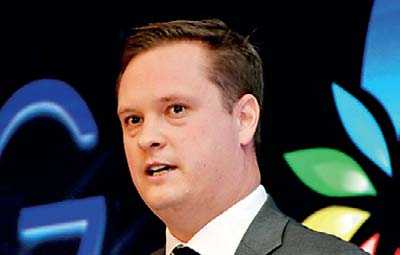 |
| Digital Asset Business Development Director for APAC Jonathon Rout |
The two-day gathering, hosted by Central Depository Systems Ltd. (CDS), a fully-owned subsidiary of the Colombo Stock Exchange (CSE), discussed areas such as the future direction of CSDs, embracing technological change and the outlook of the CSD industry with a specific focus on considerations for Asia-Pacific (APAC).
ACG is an association of securities depositories and clearing organisations in the APAC region and was formed in 1997 to facilitate the exchange of information and promotion of mutual assistance among its members. The AGM is the premier event on the ACG calendar and it opened new ground for the Sri Lankan capital market as it marks the largest gathering of depositories and clearing organisations Sri Lanka has ever hosted.
Technological revolution shaking up financial services industry
Delivering the opening remarks at the inaugural session of the AGM, CSE and CDS Chairman Ray Abeywardena said the ACG had remained resilient despite world markets constantly seeing a fair share of challenges and continuing to do so in the face of new developments in the global financial arena, be it financial, technological or in other spheres.
Pointing out that fintech was certainly the buzzword, he asserted that the technological revolution was now shaking up the financial services industry, probably more than any other industry. According to him, mobility, access to connectivity and the emergence of alternative payment methods combined with the demand for secure, personalised and convenience-driven experiences were giving new impetus to the adoption of fintech within the financial services industry.
“In terms of the capital market, disruption driven by fintech is exhibiting entirely new conceptions of investing, trading, clearing, settlement and custody and look to drive a robust infrastructure. It is therefore opportune that we all meet here today to understand the implications of fintech on CSDs and the opportunities for CSDs to leverage fintech to drive the growth of our respective capital markets,” he added.
Acknowledging that CDS was introduced to the Sri Lankan capital market in 1991 during an era of low liquidity levels and inefficiencies, he said CDS sparked the process of dematerialisation (DEMAT) and introduced electronic settlement to the country.
“Today, CDS handles DEMAT operations, accounts services, corporate action services and clearing and settlement services to its stakeholders – all possible as a result of a transformational journey of constant innovation, stakeholder focus and technical advancement. Currently, the CDS has dematerialised over 97% of listed securities, which, you would agree, is a commendable achievement for any depository,” he said.
Abeywardena also noted that Sri Lanka’s CDS was the first depository in South Asia to embrace the mandate of the ACG, which obtained ACG membership in 1998, a year after the formation of the group. “This year will mark another milestone in our journey as we complete 20 years as a member of the ACG,” he pointed out.
As for the CDS in Sri Lanka, he said they recently announced a number of new offerings focused on raising the bar in the services offered to its stakeholders.
“We have expanded our service offering to include Corporate Action services and Registrar services for companies listed on the CSE and also privately held unlisted companies, which is essentially a forward integration into our value chain. We intend to leverage technology even further in the near future by introducing an end-to-end digital CDS account opening process, which will go a long way in making the market accessible around the country and also in broad-basing our local investor base, which is pivotal to the progress of the Sri Lankan stock market in the long run,” Abeywardena outlined.
Challenges faced by CDS
Sharing further insights, ACG Chairman Dr. Byungrhae Lee emphasised that CDS as a group was faced with numerous challenges in areas such as client demand, cyber security and competition and suggested that a combination of a personal viewpoint and adapting to current situations was the only way to survive the rapid changes.
“We could maintain our independence and uniqueness and at the same time we could pursue co-prosperity through open-minded cooperation and engagement within ACG. It is important that we have our own interpretation of the current situation and adjust ourselves to the changes accordingly. The problem is that we could be tempted to be complacent and that is why we must be connected,” he added.
He also elaborated on the importance of being cautious about cyber-attacks when developing new services, noting that multiple layers of intermediaries were involved in facilitating transactions which makes it challenging to remain protected at all times.
Given that member economies are agile and adoptable, Dr. Lee said digitalisation could bring about enhanced productivity and advanced technology, while on the flipside it could result in disruption and dislocation, seeing a dip in unskilled workers in transition.
“As an economic bloc, Asia has 60% global growth and is faced with problems concerning trade, population and digitalisation. Many Asian countries, including South Korea, have taken the export-driven growth model. However, with the emergence of protectionism and trade war, our region will continue to become vulnerable. Rising population is also a rising concern for many of our member economies and digitalisation is a doubled-edged sword,” he added.
As technology continues to advance, he said institutions and regulators need to be more cautious and prepared if the advancement was to be reaped and enjoyed.
“People say the future is about platforms, linkages, synergic effects and integration. I say the future belongs to those who can take advantage of connectivity. In my view, this year’s ACG general meeting is the very place we can enhance our connectivity,” Dr. Lee stressed.
SEC calls on CDS Sri Lanka to be proactive
Securities and Exchange Commission Chairman Ranel T. Wijesinha assured that as the regulator they were deeply committed to providing assistance and support that was necessary for CDS Sri Lanka to play a larger role in the ACG and on the international stage.
“CDS in Sri Lanka needs to be more proactive and integrated with the ACG. The SEC is deeply committed to provide all the assistance and support that is necessary for the CDS to reach that goal,” he added.
Sharing his remarks on fintech, he stated that embracing technology remained a key priority for capital markets around the world and went on to outline the importance of strongly considering all risk management aspects when implementing innovative technologies.
Wijesinha also stressed the need to create a taskforce to redress issues in terms of regulations, legislation and building infrastructure in ACG in order to be a proactive regulatory partner.
“To me, the role of the regulator is extremely important and the robust regulation is a fundamental ingredient in a sustainable market economy. We can’t live in isolation from technological developments. We need to create taskforces to keep abreast and ready for the technological changes to come,” Wijesinha added.
Central Bank reiterates support to promote e-payments
Delivering the keynote address, Central Bank Governor Dr. Indrajit Coomaraswamy told the financial services sector that the bank would not stand in the way of progress with its controls but insisted that the regulator would closely monitor processes to ensure the progress achieved did not lead to the destabilisation of the financial system.
“As a regulator, the Central Bank is faced with the challenge of promoting technological advancement, and at the same time doing so in a manner that is not disruptive and ensures the stability of the financial sector is not consolidated. This is more complex than it sounds, particularly in Sri Lanka with our financial system having a large branch network — lots of bricks and mortar. To move from a branch-based model to embracing technology without destabilising the financial system, it is a real challenge for the regulator to ensure that they don’t stand in the way of progress, but ensure that the progress leads to disruption which undermines the whole system,” he pointed out.
He said that regardless of who innovated, all fintech companies require a Central Bank review if it relates to the banking and financial industry.
“Sri Lanka is working to strengthen its data protection laws. Similarly, we must ensure that fintech and financial institutions respect customer data and do not misuse. Many times customers are unaware of the gravity of what they do and eventually expect regulators to protect them. Thus, all regulators need to raise awareness of the risks involved in data sharing among customers and their networks,” Dr. Coomaraswamy said.
Reiterating that the Central Bank had been proactively encouraging electronic payments over cash to allow expansion of economic activities in the areas of e-commerce, he noted they had allowed non-bank fintechs to enter services such as digital payments service provision and encourage collaboration with the banking industry, which also allows them to regulate fintechs better.
“If fintech is used well it has immense potential to improve the financial services offered to the public. There is often a confusion that regulation somehow gets in the way of liberalisation and increases transaction cost, but as modern technology advances there are immense benefits. We are supportive of fintech innovations, but we are also cognizant of the regulatory challenges they hold. To address this, the Central Bank has initiated a regulatory stamp box so that they can provide fintechs with necessary guidelines when developing their products in a safe and secure manner,” he emphasised.
New electronic trading platform for domestic financial market
In terms of the payments and settlements landscape, Dr. Coomaraswamy said the Central Bank was continuously aligning its infrastructure with international best practices.
“The Central Bank plans to establish a state-of-the-art electronic trading platform and central counterparts clearing and settlement system to facilitate electronic trading and straight through processing of transactions in the domestic financial market. This would enhance transparency, develop the financial market and ensure financial system stability,” he stressed.
Dr. Coomaraswamy said the proposed system had multifaceted objectives which included deepening the domestic activities of the domestic financial market to facilitate efficient price discovery and enhancing efficiency of properly managed settlement and counter party risks as well as greater investor protection to secure financial system stability.
In addition, he asserted that the National Payments Council appointed a committee to look into possible ways of reducing usage of cheques.
“One of the findings of the committee is that there is a high volume of cheques issued as dividend payments from the listed companies of the CSE, even for very small values. We encourage and request the CSE to consider the possibility of the mandatory use of electronic payment methods for dividend payments. Similarly, there are new technologies that can be explored by securities and exchanges,” he added.
The Central Bank plans to establish a state-of-the-art electronic trading platform and central counterparts clearing and settlement system to facilitate electronic trading and straight through processing of transactions in the domestic financial market. This would enhance transparency, develop the financial market and ensure financial system stability - Central Bank Governor Dr. Indrajit Coomaraswamy
In terms of the capital market, disruption driven by fintech is exhibiting entirely new conceptions of investing, trading, clearing, settlement and custody and look to drive a robust infrastructure. It is therefore opportune that we all meet here today to understand the implications of fintech on CSDs and the opportunities for CSDs to leverage fintech to drive the growth of our respective capital markets - CSE and CDS Chairman Ray Abeywardena
We could maintain our independence and uniqueness and at the same time we could pursue co-prosperity through open-minded cooperation and engagement within ACG. It is important that we have our own interpretation of the current situation and adjust ourselves to the changes accordingly. The problem is that we could be tempted to be complacent and that is why we must be connected - ACG Chairman Dr. Byungrhae Lee
CDS in Sri Lanka needs to be more proactive and integrated with the ACG. The SEC is deeply committed to provide all the assistance and support that is necessary for the CDS to reach that goal - Securities and Exchange Commission Chairman Ranel T. Wijesinha
Other speakers of the inaugurations session included APAC Digital Asset Business Development Director Jonathon Rout, McKinsey and Company Associate Partner Dr. Andreas Waschto, China Securities Depository and Clearing Corporation Ltd. Deputy Chairman and General Manager Dr. Wenhua Dai, LSEG Technology Head of Post Trade Solutions Terry P. Gibson and an eminent line-up of international and local professionals as panellists.
LSEG Technology, the technology business of the London Stock Exchange Group, supported the 22nd ACG AGM as the Platinum Sponsor. SWIFT, Central Depository Services (India) Ltd. (CDSL), Percival, LankaClear, Iron One Technologies Ltd. and Deutsche Bank supported the event as Silver Sponsors. HSBC and Citi Bank were the Bronze Sponsors of the event.
Pix by Lasantha Kumara
